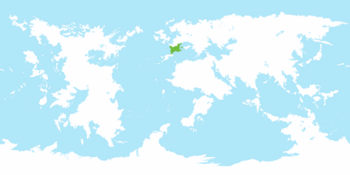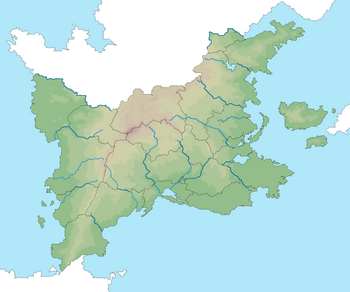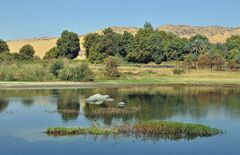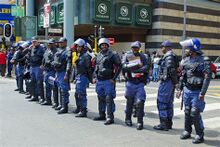Toloria: Difference between revisions
| Line 141: | Line 141: | ||
==Law Enforcement and Crime== | ==Law Enforcement and Crime== | ||
[[File:National Police.jpg|220px|thumb|right|A specialized provincial police unit stands watch at a protest.]] | [[File:National Police.jpg|220px|thumb|right|A specialized provincial police unit stands watch at a protest.]] | ||
There are three different types of law enforcement in the Tolorian Kingdom. Their jurisdiction is divided into national, provincial, and municipal authorities. | There are three different types of [[Wikipedia:law enforcement|law enforcement]] in the Tolorian Kingdom. Their jurisdiction is divided into national, provincial, and municipal authorities. | ||
* '''National law enforcement agencies''', like the [[Tolorian National Police]] and the [[National Security Agency(Toloria)|National Security Agency]] have jurisdiction at a national level, and are always the highest ranking officers when involved in operations. They are usually involved in situations where national security is at risk, such as terrorist plots, bomb threats, and mass shootings. | * '''National law enforcement agencies''', like the [[Tolorian National Police]] and the [[National Security Agency(Toloria)|National Security Agency]] have jurisdiction at a national level, and are always the highest ranking officers when involved in operations. They are usually involved in situations where national security is at risk, such as terrorist plots, bomb threats, and mass shootings. | ||
Revision as of 20:40, 19 August 2019
This article is incomplete because it is pending further input from participants, or it is a work-in-progress by one author. Please comment on this article's talk page to share your input, comments and questions. Note: To contribute to this article, you may need to seek help from the author(s) of this page. |
Tolorian Empire | |
|---|---|
|
Flag | |
Motto: ---- In Steadiness, Prosperity | |
 Toloria in the International Northwestern Union | |
 Map of Toloria | |
| Capital | Asaleka |
| Official languages | |
| Recognised regional languages | Helurian |
| Ethnic groups (2018) |
|
| Demonym(s) | Tolorian |
| Government | Unitary Semi-Presidential Republic |
| Dumisile Gwaza | |
| Deda Meshindi | |
| Legislature | National People's Assembly |
| Area | |
• Total | 1,257,094 km2 (485,367 sq mi) |
• Water (%) | 5.23 |
| Population | |
• 2018 estimate | 62,541,874 |
| GDP (PPP) | 2018 estimate |
• Total | 1.45 trillion |
• Per capita | $23,200 |
| Gini (2018) | medium |
| HDI (2018) | high |
| Currency | Yusis (ɣ) |
| Date format | dd/mm/yyyy |
| Driving side | right |
Toloria, officially the Tolorian Empire, is a country spanning the southern tip of Dihara. It is a peninsula, being surrounded by the ____ in the east, the ____ to the south, and ____ to the west. It is divided into two separate territories, continental Toloria and an island chain consisting of 15 islands. The largest of these islands are _____,_____, and_____. The country is home to 62.5 million people. 88% of the population are ethnically Tolorian.
History
Geography
Toloria is a country with a mostly flat landscape. There are very few mountain peaks. The ____ Rainforest, located the southwestern Toloria is the only area with a great density of trees. The rest of the country is grassland. The ___ Plains located near the northern portion of the country is known for its biodiversity.
Climate
Toloria has a generally Meditteranean climate, due in most part, because it is surrounded by water on three sides. It features mild, wet winters and hot, dry summers. The presence of bodies of water around the country keep it relatively cooler than other countries that have a close proximity to the equator. The average yearly amount of precipitation is around 425 mm.
Biodiversity
Demographics
Ethnic Groups
Ethnic Tolorians, also referred to as Zulu people, make up the majority of Tolorian citizens, constituting 65% percent of the population. The Yorulu make up 19% of the population, making it the largest minority in the country. This ethnic group came about as a result of colonization. Immediately following the granting of its independence, many of the colonial citizens chose to stay and continue to capitalize of the country's abundant resources. Seeing a chance to capitalize on ending rule by the former colonial power, the Tolorian rulers enacted the law of miscegenation, forcing interracial breeding. This led to the Yorulu, meaning "multiple roots" in the native language, being created. In the last decade, this group has grown exponentially. The Bantu population is the second largest minority, making up 11% of the population. However their numbers have been dwindling in recent years. The Hutu's make up 8% of the population.
Around 4 million of the Hutu people are refugees from the northern territories. Immigration laws are relatively relaxed in the country however they have become tougher in the past few years, due to the rising influx of refugees.
Government and Politics
Law Enforcement and Crime
There are three different types of law enforcement in the Tolorian Kingdom. Their jurisdiction is divided into national, provincial, and municipal authorities.
- National law enforcement agencies, like the Tolorian National Police and the National Security Agency have jurisdiction at a national level, and are always the highest ranking officers when involved in operations. They are usually involved in situations where national security is at risk, such as terrorist plots, bomb threats, and mass shootings.
- Provincial law enforcement agencies, like the Asalake Poléce Provinciále operate within the confines of their province. There are 9 different provincial law enforcement agencies, and this group generally handles the majority of policing. In majority of cases, they are the highest ranking agencies, however, they do collaborate with national security agencies in some cases.
- Municipal law enforcement agencies, like the Asalake Porté Paťrol are the lowest ranking enforcement agencies and only deal with issues in their municipalites. This would include matters of port security, town security, and specific local areas of interest. They operate under the command of local governments, rather than the national government. However, the national government has the power to seize command of these agencies whenever necessary.



